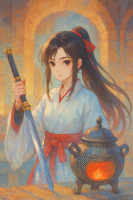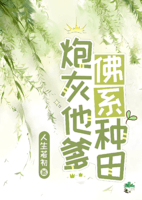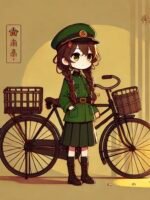I Have A Store C168
by MarineTLChapter 168: Salt and Pepper Lobster
The elderly couple helped out as well, taking on smaller tasks like soaking the glutinous rice.
Before wrapping zongzi, the glutinous rice had to be soaked for a while. Soaking makes the zongzi firmer and the cooked rice softer and stickier. Once soaked, the rice absorbs water, swells, and increases friction between grains, preventing the zongzi from falling apart during cooking.
Plenty of ingredients needed to be prepared too—fortunately, Zhou Yimin had abundant supplies.
“Alright, Yimin, let the others take over now!” the old man said.
After all, it wasn’t just for their own family to eat. Since others would be eating too, the others should help out as well.
Zhou Yimin nodded and stopped what he was doing, leaving the remaining work to the village women.
Just then, Third Aunt came briskly with several village women in tow.
Upon entering, they greeted Zhou Yimin’s grandparents before saying hello to Zhou Yimin.
They had seen the large tub of glutinous rice soaking in water when they walked in and were amazed. Sometimes, Sixteenth Uncle’s (Sixteenth Brother’s) generosity made their hearts ache.
“The meat’s all sliced. You can marinate it,” Zhou Yimin said directly, skipping the pleasantries.
“Why are we slicing meat?” someone asked in confusion.
Someone who had seen meat zongzi before guessed, “Are we making meat zongzi?”
There was a collective gasp.
Meat was so rare and expensive nowadays—using it to make zongzi? Only Sixteenth Brother could come up with that.
Who wouldn’t want zongzi with meat?
People say Northerners prefer sweet zongzi, but it’s not like they would turn down savory meat ones. In these times, even plain zongzi were a treat—who would be picky?
After all, zongzi were made with glutinous rice.
Rice itself was a refined grain, and many couldn’t even afford to eat it regularly!
So meat-filled savory zongzi? Even more of a luxury.
Zhou Yimin nodded. “There will also be ones with dates, beans, and peanuts. A bit of everything, different flavors.”
Talking about meat zongzi made Zhou Yimin recall the mooncakes he ate as a child in his previous life. Some even had fatty pork inside—proof of how much people longed for meat back then.
Mooncakes from the north and south seemed to differ too.
Among them, the most well-known in the south were Cantonese and Suzhou-style mooncakes.
Cantonese mooncakes were famous for their meticulous ingredients and exquisite craftsmanship. They featured thin, soft crusts, beautiful presentation, and elegant packaging.
Suzhou-style mooncakes, classified as Suzhou pastries, were beloved in Jiangsu and Zhejiang regions. Their signature traits were their flaky, multi-layered crusts, attractive color, rich but not greasy fillings, and delicate texture.
The biggest difference between Suzhou and Cantonese mooncakes was the crust. Suzhou-style mooncakes had a flaky crust, and the process included making the crust, wrapping the filling, shaping, and baking.
In his previous life, the first time Zhou Yimin saw a Suzhou mooncake and heard from a friend that it was also a mooncake, he was completely dumbfounded. He had always thought mooncakes were just like the Cantonese ones and assumed they were the national standard.
In the north, there were also Beijing-style and Shanxi-style mooncakes.
Beijing-style mooncakes resembled Suzhou-style in appearance, with flaky crusts, a bit like mung bean cakes found in the south.
Shanxi-style mooncakes, on the other hand, looked more like Cantonese ones—at least in outward shape and form.
The women brought along zongzi leaves too.
Otherwise, it wouldn’t have taken them that long just to gather a few people.
Once they heard that Yimin was planning to make so many zongzi, they figured he wouldn’t have enough leaves at home. So, they had gone around collecting extras from households across the village to bring over.
Next came soaking and washing the zongzi leaves.
Making zongzi involved quite a few steps.
Once all the prep work was done, the village women sensibly took their leave, saying they’d return after lunch. The rice needed at least four to five hours to soak, after all!
In the village, people were already buzzing about the zongzi-making.
It wasn’t something that could be kept secret—several people had been called in to help, and Zhou Yimin wasn’t trying to keep it hush-hush either.
“Is Sixteenth Uncle really giving them out to everyone?”
“Of course! Over a hundred jin of glutinous rice—how could they finish it all themselves?”
With all the extra ingredients, making several hundred zongzi wouldn’t be a problem. Every villager getting at least one to try wasn’t far-fetched.
“That’s true. Really living up to the name, Sixteenth Uncle.”
Each zongzi being about the size of a fist meant they could make hundreds. With only a few hundred people in Zhou Family Village, one per person was totally doable.
Everyone got excited at once—especially after hearing there might be meat in them.
By noon, Zhou Yimin started preparing the large lobsters, beginning by scrubbing them clean.
He placed the lobster’s head on the cutting board and used a knife to blunt the sharp spikes, then split the lobster’s head in half from the center.
Next, he opened up one half of the split head—much like lifting a crab’s shell—by grabbing one of the large antennae and twisting it off.
Once opened, he removed the gunk inside. Most of the lobster’s organs—generally inedible—were in the head.
Finally, the cleaned lobster was chopped into smaller pieces. The legs and thick antennae were lightly cracked with the back of the knife—not enough to break them, just enough to let flavor seep in during stir-frying.
Of course, if he were steaming them, none of this would be necessary. A simple clean, steam, and dip in sauce would do.
But Zhou Yimin figured Grandpa and Grandma might not be used to eating plain steamed seafood, so he decided to make Salt and Pepper Lobster instead.
Laicai was still tending the fire, while carefully watching his older brother cook.
After handling the lobster, Zhou Yimin started on the seasoning.
He peeled and minced garlic, chopped a quarter of a red chili into bits the size of the garlic, and set them aside.
Then came the stir-frying of Huai salt.
Huai salt was a simple blend—just salt mixed with five-spice powder.
Soon, the aroma filled the air.
Laicai and Laifang, the two little ones, hovered around the pot, sniffing eagerly.
Thankfully, Laicai had kicked his bad habit of letting his nose run. Otherwise, just hearing those sniffling sounds would’ve been unbearable.
Third Uncle had just returned from work.
The smell was so good, he caught a whiff before even getting close and couldn’t help but quicken his pace. He even copied the kids and peeked into the kitchen.
“That lobster’s huge! Looks like a spirit beast!” he couldn’t help but say.
Zhou Yimin replied, “I’ve heard some of these lobsters can grow to thirty or forty jin. This one’s considered small.”
Zhou Xuqing’s eyes widened, and he inhaled sharply.
Thirty or forty jin lobsters?
Terrifying!
“Bring it out. Time to eat,” Zhou Yimin said again.
Then he brought out a bottle of red wine—one of the five he brought back that day. The remaining four were kept safely with Grandpa.
“Grandma, try this,” Zhou Yimin said as he passed her the best piece of lobster meat.
The old lady beamed. “Good boy! Yimin, you eat more too.”
Zhou Xuqing and his wife nibbled on the lobster legs and were quite satisfied. They even had a small glass of so-called foreign liquor—just enough bragging rights for Zhou Xuqing to boast about it for a week.
(End of Chapter)










0 Comments